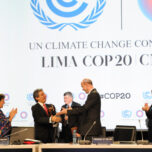February 19, 2021 — A U.S. president announced America’s distancing from the most significant climate treaty in history. Sixteen years later, President Donald Trump followed suit. In other words, whiplash is not new to U.S. environmental politics — and, for decades, it has been at the center of our treaty-making.
Trump took a page out of President George W. Bush’s playbook when he announced in 2017 he was ditching the Paris climate deal. Bush had taken similar action when he refused to move forward with the Kyoto Protocol, the 1990s precursor to the Paris Agreement. On Inauguration Day of this year, President Joe Biden initiated the rejoining of the Paris Agreement. Today it becomes official.
More whiplash.
Rejoining the Paris deal, according to John Kerry, the new U.S. envoy on climate change, will allow the U.S. to become a global climate leader. He summarized the administration’s core belief about the global climate crisis: “It is existential.”
But climate change isn’t the only existential crisis the world is facing. Biodiversity loss and ocean exploitation, to name just two, are crises happening concurrently with climate change — and much of the rest of the world has turned to a number of lesser-known environmental treaties to address these. But, the U.S. government has never signed, has failed to ratify, or still dances around them. America may re-sign the Paris Agreement but it will not be a convincingly green leader on the global stage until it confronts the forgotten environmental treaties it has trapped in limbo, sometimes for decades — and the world will suffer more from all the existential crises it faces than if the U.S. led the way.
From Walden Pond to Paris
When I teach college students in my U.S. environmental policy courses, I start with Thoreau’s cabin on Walden Pond and end with the Paris Agreement. America popularized the genre of nature writing, came up with national parks, and drafted the first federal endangered species lists — nature-saving solutions now adopted by many nations around the world. Yet we’ve failed to fully embrace the global community’s choice of nature-saving solution: environmental treaties. By hyper-focusing and hyper-villainizing any one former administration’s climate legacy, America obscures its past failing as a whole to step into environmental leadership positions.
Few of the non-climate environmental agreements are household names — the Convention on Biological Diversity, the Bonn Convention, Law of the Sea — but America’s lack of official participation makes it a major holdout on global efforts to stop biodiversity loss, protect migratory animals, and steward our global ocean. While America still sends “observers” to meetings that further negotiate or expand these treaties, formally speaking, the country of Liechtenstein (estimated population 38,000) currently has a more legitimate voice in global environmental governance than America.
Take the Convention on Biological Diversity, the Paris Agreement-equivalent for the extinction crisis. In 1993, the Clinton Administration signed the treaty, it arrived at the U.S. Senate for ratification, and the Senate did nothing. The documents wait for action in a kind of treaty purgatory, with a sad internet presence, alongside thirty-six others. Consider the Bonn Convention, officially known as the Convention on the Conservation of Migratory Species of Wild Animals (CMS). It coordinates transboundary operations that conserve the migratory routes and habitat of mobile species. Canada and Mexico join the U.S. and a handful of other major nations that never signed on to this convention. It’s true that America has signed on to a few of CMS’s memorandums of understanding, but on a species-by-species basis. Meanwhile, billions of birds continue vanishing from North America’s migratory routes over just one generation, including climate-sensitive seabirds like albatross and petrels.
Lastly, the UN Law of the Sea Convention (UNCLOS), an agreement that governs human activities in seas and oceans: America was one of its earliest architects in the 1980s, but in the 1990s the treaty followed the similar signed-but-not-ratified fate as the biodiversity agreement. Today, scientists in the U.S. are again helping to design an international legal binding agreement that will address problems resulting from UNCLOS’s gaps, notably: how to deal with the overfishing of biodiversity on the high seas, technically called Marine Biodiversity of Areas Beyond National Jurisdiction (BBNJ). After the pandemic subsides, the BBNJ treaty will likely be on the diplomatic table, but scientists are cautious, based on America’s fickle history, that political leaders will formally join, despite the urgent message of ocean exploitation.
Such concrete action would make absolutely clear where America will and will not lead when it comes to environmental problems, from climate change to biodiversity loss to overfishing of the high seas.
There is no shortage of political explanations and diplomatic rationales for America’s historical self-distancing from these agreements. First, the U.S. Senate must advise to ratify treaties by a two-thirds vote. Some senators have long been treaty-averse, with arguments circling that claim treaties risk U.S. sovereignty and its global economic position. Second, the U.S. has in these cases preferred to make progress through soft diplomacy, making handshakes and good neighbors without signing the dotted line.
These political traditions are like our battleships — they don’t turn on a dime, no matter which party is in power. But from a scientific and historical perspective, a smart approach would be the one that is most comprehensive: confronting all the treaties that are in limbo now, in a transparent way. Such concrete action would make absolutely clear where America will and will not lead when it comes to environmental problems, from climate change to biodiversity loss to overfishing of the high seas.
Reconciling the Past to Move Forward
The lack of clear-eyed and transparent treaty-making has long-term consequences, as seen in another instance where the U.S. has failed in this area: the injustices wrought by not honoring and breaking treaties by the U.S. government against Native Americans. Many Native Americans still have high levels of mistrust for non-tribal government because of this historical trauma and, because of this and many other reasons, often low levels of voter turnout. When Native American communities do engage, they can swing political outcomes. The lack of Native American participation in democratic processes is a lasting bruise on our democracy. As with other injustices, our ability to successfully move forward on this front requires a full recognition of the past.
America’s leaders have a window and opportunity in 2021 to turn this legacy around and make it clear where the country will and where it will not lead on the environment.
Turning the page on America’s environmental story also involves an honest telling of the past. That story is rich in national vision but undeniably fickle when it comes to the hard work — arguably the hardest work — of saving the whole planet through global cooperation and agreements.
America’s leaders have a window and opportunity in 2021 to turn this legacy around and make it clear where the country will and where it will not lead on the environment. One of President Biden’s orders signed on January 27 seeks the U.S. Senate’s advice on ratifying the Kigali amendment — an important amendment to the lesser-known climate treaty, the Montreal Protocol — which could reduce the use of climate-warming hydrofluorocarbon (HFC) pollutants. This treaty expansion ratification is possible due to at least some bipartisan agreement, in part because of its potential economic benefits for the U.S.
And further bipartisan environmental agreement in the Senate does exist. The 2020 passage of The Great American Outdoors Act, the largest land conservation legislation in the 21st century, had bipartisan support. Similarly, there may be bipartisan support for the creation of a jobs corps bill that has the same appeal of supporting public lands and rural jobs, while also focusing on the new administration’s climate agenda. This kind of bipartisan momentum matters for seeking ratification of green treaties in the Senate.
If successful, the ratification of an expanded Montreal treaty still stays within the climate action realm the Biden Administration seems most comfortable in — at least for now. By ratifying or at least confronting the treaties that have been left in the lurch all these years, the country has the opportunity to show its environmental leadership in a way that is clear about what it does — and does not — consider “existential” enough to address meaningfully in concert with other nations.
President Biden says he will host global leaders on Earth Day 2021 for a dialogue about the climate crisis, echoing Kerry’s language, that climate change is an existential threat. “And just as with the pandemic,” Biden said, “it requires global cooperation.”
With the pandemic, another science-based crisis, America can build trust with other nations with laser focus and moving forward. But for America to become an environmental leader, the country must reckon with its past failings to lead, take stock, and understand that climate change is not the only environmental problem that needs leadership and global cooperation.
Related Posts
Ensia shares solutions-focused stories free of charge through our online magazine and partner media. That means audiences around the world have ready access to stories that can — and do — help them shape a better future. If you value our work, please show your support today.
Yes, I'll support Ensia!




Our planet keeps waiting. Our natives continue being ignored!!
Los intereses creados son inmensos!!
The United states of North America continues to participate in talks, when action is mandatory.
Congratulations to ENSIA! great work!! ❤️❤️❤️